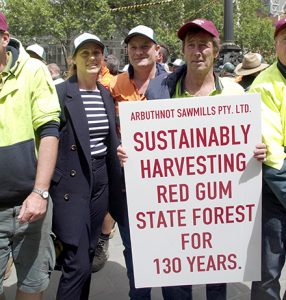Timber industry peak bodies have urged the Victorian Government to urgently intervene to save the Victoria’s native timber industry following the extension of an injunction preventing timber harvesting in 13 coupes. Source: Timberbiz
The Supreme Court’s decision is the latest setback for the industry, which was already reeling from the bushfires, the Andrews Government’s plan to phase out the industry from 2024 to 2030, and bureaucratic inaction that’s preventing the harvesting of burnt coupes.
The environmental group WOTCH – Wildlife of the Central Highlands – has so far successfully argued in court that the devastation of the East Gippsland fires has placed further strain on threatened species in the state, and that areas untouched by fire in the Central Highlands, near Healesville, must not be logged.
WOTCH brought the case because the areas targeted for logging are habitat for the greater glider, the smoky mouse, the sooty owl and the powerful owl.
While the industry’s peak bodies are assessing the ramifications of the court decision, they say it is clear that the ongoing uncertainty and the lack of security is devastating for workers and businesses across the native timber industry.
Victorian Association of Forest Industries CEO Tim Johnston said that without immediate action from the Victorian Government to get harvest and haulage contractors working again and getting timber flowing into mills, the industry will grind to a halt and even more workers would be stood down.
“The government’s so-called Victorian Forestry Plan appears to be in disarray. It is critical that the government now sit down with industry – workers, contractors and processors – to deliver a workable and sustainable future,” Mr Johnston said.
Australian Forest Contractors Association General Manager Stacey Gardiner said harvest and haulage contractors in East Gippsland – who were on the frontline fighting bushfires and making roads safe again by the removal of burnt and dangerous trees – are now at breaking point after months of no or little work.
“Many contractors have been out of work or operating well below capacity since the fires, which is untenable. Without immediate financial support or an immediate resumption of full operations form forest contractors and their crews, many of these businesses will fold, and the rest of the industry will follow.”
AFPA CEO Ross Hampton said the premature closure of the industry would be on Premier Andrews’ head if he failed to act now.
“This is a sustainable industry employing thousands of people in regional Victoria – it is too big to fail. If the Premier is serious about supporting timber workers and regional communities, then he must do everything he can to get the industry working again.”






